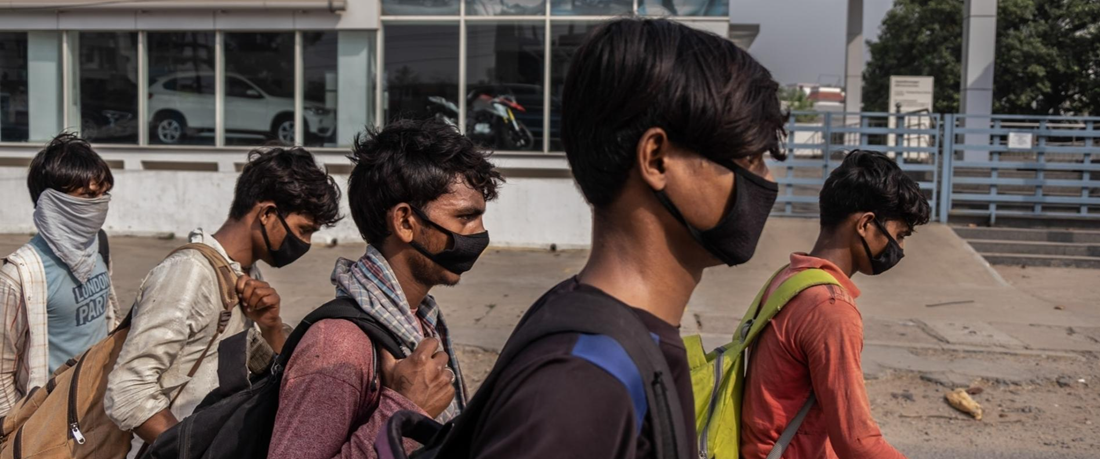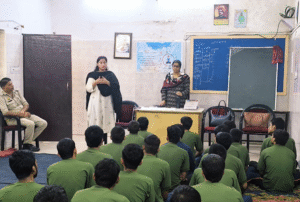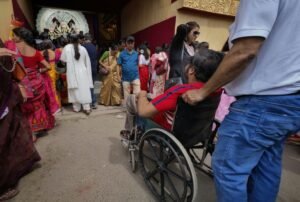
“My 3-year-old son is suffering from TB. He received regular treatment in Mumbai but we are unable to get any treatment for him in the village.” – Ravi Kumar*, owner of a small stationery shop, Hazaribagh district
“The rains have broken my house down. My family (wife and two kids) are staying under plastic covers. We have no money left. Getting rations is difficult. No one is willing to help us. I have put my parents in a nearby house and I am helpless. I would want to go back to Mumbai as soon as work opens, I would have never returned to the village if it was not for the lockdown.” – Adil Mohammed*, taxi driver, Giridih district
“We ran out of money, neither my husband nor I have any access to work.” – Mita Mandal*, wife of a decorator, Giridih district
“We are not able to earn anything. Our previous payments in Mumbai weren’t given since March 2020. Our ration card is locked, they say that we can only use it online but Nagar Sevak is not helping us. We don’t get any ration. We are keen to do daily wage work or anything that comes our way.” – Arif Hussain*, tailor, Dhanbad district
“I am in desperate need of money and medical assistance for my wife who is suffering from a liver condition. My previous employer owed me 70,000 rupees but he is willing to pay his dues only when I rejoin work. I prefer to work in Jharkhand now so that I don’t have to leave my wife. I need employment and medicines urgently.” – Rajmohan Sinha*, Brihanmumbai Municipal Corporation pipeline worker, Simdega district
COVID-19 created a parallel socio-economic crisis for many, as incomes fell dramatically, especially for those living with the greatest precarity, inequalities heightened, hunger increased, and millions of mostly informal workers walked long distances home to feed their ailing families. It was the absence of social protection, lack of food rations and cash to fulfil other necessities, and inadequate government support, which compelled the inter-state workers to leave cities and return to their villages, often at great risk to their lives, where many believed that the rural economy and traditional kinship networks would be able to better sustain them.
A Joint Intervention
In early July 2020, iProbono partnered with the National Law School (Bangalore) Alumni Group through Diya Kapur, our Supervisory Advocate. She is also part of the Aahan Vahaan project, which facilitated safe transit for workers stranded in Mumbai to their homes in Jharkhand and Chattisgarh via chartered flights and Shramik Trains (which were started to enable workers to return to their home states). The goal of our shared work was to forge long term links to social protection through the National Rural Employment Guarantee Act, the Public Distribution System, and pension and other social security and local emergency relief schemes for a group of approximately 80 workers and their families who had returned to Jharkhand in June.
iProbono reached out to friends at the Social Accountability Forum for Action and Research (SAFAR) and in turn their grassroots partners, to enable these linkages in villages across Hazaribagh, Simdega, Giridih, Ranchi, Deogarh, Palamu, Koderma and Dhanbad districts, and in smaller numbers across Bokaro, Chhatra, East Singhbhum, West Singhbhum, Garhwa, Gumla, Jamtara and Godda districts. The activist networks created by the Social Audit Unit, Jharkhand and NREGA Watch, which work on access to welfare rights and state accountability carried out the field work, in coordination with members of the Aahan Vaahan and iProbono teams based across different cities.
We first carried out detailed surveys with each of the returnee worker families to gather data on their current status of access to government entitlements and basic demographic details through the Aahan Vaahan volunteers who had maintained phone contact with many of the workers. We then translated the survey responses, and passed on the information to local activists for required follow up.
Working to leverage state accountability and prompt access to necessary relief, we catered to the requirements of the workers according to their urgencies. 25 families were treated as high priority cases, based on our assessment.
Initial Findings through the Worker Survey

Photo Credit: PTI
- In light of the raging pandemic, the government approved several schemes to help the population. 62 percent of workers were unaware of any such aid.
- 37 percent knew of the schemes but had no idea how to access them.
- Home states lack the infrastructure required to reintegrate migrant workers in terms of being able to provide them access to employment.
- Many daily wage earners were not paid their dues before the lockdown, and had thousands of rupees pending with their former employers.
- Despite government orders, inter-state workers were forced to pay their house rent in Mumbai during the lockdown.
- A large number of these workers did not have access to adequate housing in their native villages.
Enabling Access With the assistance of on-ground activists, James Herenj from NREGA Watch and Gurjeet Singh and Sushil Chandra from the Social Audit Unit (Jharkhand) and their colleagues, we applied to schemes like PM Awas Yojana, PDS schemes, MGNREGA job cards and pension cards on behalf of most of the workers. Sustained follow-ups by local volunteers with the returnee workers enabled them to complete applications. While a few among them have received benefits, many are still waiting to receive their entitlements due to bureaucratic delays in the process.
Through Aahar Portal, Labour Net and The Jharkhand Migrant Labour Control Room, we provided relevant departments with names and details of the workers and facilitated contact between the two for further action. Almost every family is now registered with the Aahar portal, which is an online platform for applying for ration cards, renewal of ration cards, and also for filing complaints for any issue faced in receiving rations.
Challenges Faced during the Project
Priya Sharma, a volunteer with Aahan Vahaan, had this to share with us: “Though reaching back to the safety and calm of their villages (from cities where they were no longer able to pay for survival) seemed the most important step at first, once they reached their destination new issues cropped up. I remember getting distress calls from some of the workers explaining how their woes seem to have no end even back home.”
There were some challenges that we faced during the course of the project –
- The nexus between concerned departments and local authorities often created considerable delays. In one case, a worker who returned to Jharkhand struggled for housing after his house was damaged due to heavy rains. He and his family were forced to sleep under plastic covers. His mother was assigned a house under the PM Awaas Yojna but he didn’t receive any help from the local Panchayat or the state authorities in procuring temporary or more permanent housing despite repeated requests by him and volunteers from the Aahan Vaahan team.
- Many returnee workers did not want to work under the MGNREGA scheme since they were used to doing highly skilled work in the cities, and most jobs available locally through the scheme involved basic manual labour like carrying construction materials.
- Some of the returnee workers had Maharashtra telephone connections which made it difficult for us to get in touch with them as their SIM cards stopped working after they returned to Jharkhand. Some of them also discontinued the use of their previous phone numbers and got new ones which we were not aware of.
- We also observed that there is a considerable gap between procuring a job card under MGNREGA scheme and obtaining employment. While authorities allege that workers do not volunteer to access available services, the workers complain that they aren’t given information about what is available.
- The job card and ration card application process mandates the submission of a printed copy of the receipt after online submission of the form. Taking a printout of the receipt and submitting the hard copy to the authorities was a challenge for most of the workers during the lockdown. This resulted in their applications being rejected.
Positive Outcomes
With time and adequate resources, we facilitated access to entitlements to some workers —

Alok Kiro, formerly a construction worker linked to the Nutri Garden scheme in Simdega.
- A worker from Simdega district received the ‘Aam Bhagwani’ benefit under the Nutri Garden Scheme of MGNREGA. He and his family were given access to a 1.5-acre orchard for mango farming, and to other raw materials for sowing, creating trenches, and a pond to protect the farmland. The objective of this scheme is to create an additional asset for the family which gives income every year with a medium-term gestation period.
- Lawyers, all volunteering their time at the Aahan Vahaan project, negotiated with employers in Mumbai and in most cases succeeded in arranging for dues to be returned to workers.
- Many workers were able to access emergency food relief through the district administration scheme as well as ration through the PDS scheme.
- We were also able to facilitate immediate medical support to a few workers in hospitals through the local migration help desks.
While our work towards long term rehabilitation of the workers continues, we observed that about 60 percent had already returned to Mumbai by early November 2020 and others were keen on returning by the end of this year.
The cases we supported provide a snapshot into the extensive challenges that interstate workers are currently facing. While state welfare schemes and relief entitlements are in place, the reality of people being able to access them in times of crisis is fraught with challenges. In addition, the lack of information, digital hurdles, manipulation by middlemen and the gaping vacuum of requisite job opportunities imply that the crisis is far from over.
On a hopeful note, through the consistent efforts and support from our partners, the team managed to alleviate the immediate economic crisis of the returnee workers in the Aahan Vahaan project and we hope to continue these efforts in the coming months.
*Names changed to protect privacy
Featured Photo by Saumya Khandelwal.












